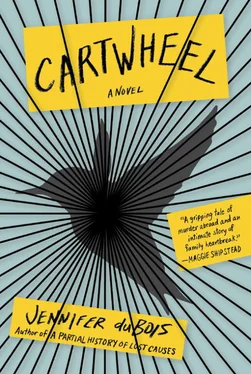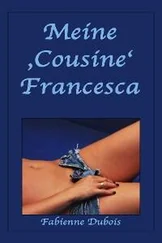Suddenly, a whip-crack sound issued from outside. “Jesus.” Andrew hurried to the window. “Is that a gun?”
Maureen joined him. Across the street, in a small park, two young men were indeed holding guns, though nobody around seemed particularly nervous, besides a flock of scattering birds.
“I think they’re just trying to spook the pigeons,” said Maureen. She had not jumped when the gun went off. It was admirable and also suspicious, this tendency of hers not to jump.
“I wonder why,” said Andrew, though he wasn’t really wondering. He went back to sit on the bed.
Maureen lingered a moment, staring into the gathering darkness. “What did you think of the lawyers?” she said, turning around.
“They seem competent,” said Andrew. This was a keyword from assessing Janie’s doctors in the days before the Internet—when, after poring over medical texts at the library, after seeking third and fourth opinions, Andrew and Maureen had had to basically guess at who was right and what was true. The sheen of competence had always impressed them. It seemed possible to smell bullshit, and fear, even if you didn’t know all the details.
“Good,” said Maureen, coming to join Andrew on the bed. She squeezed his hand dryly, asexually. Andrew looked down at hers—it was sturdy and unadorned, slightly shaky from the effects of the terrifying boatloads of caffeine she must have consumed. He knew she was letting him off the hook—that it was understood that there was more to say, but that, for now, she was going to pretend that he had said enough. “Well,” she said. “I think you know what we could really use about now.”
“Some crystals,” said Andrew automatically. “Maybe in a pendant or something.” It was generous of her to give him the punch line to this most ancient and exclusive of in-jokes—dating back to the day during the darkest season of Janie’s illness when the hippie neighbors had called and invited Andrew and Maureen meaningfully over for tea and then had clutched their hands and given them a pile of greasy crystals instead. Maureen had laughed-choked-cried afterward: Crystals? They schedule a fucking appointment like that and then they give us fucking crystals? Crystals? Crystals? She’d said “crystals” over and over, with slightly varied intonations and ever more absurd facial expressions, until they were both laughing, laughing a complicated and manic and dangerous laugh on the floor, letting their aging bones hit hard against each other’s, commenting on the amount of grime that had been allowed to grow on the linoleum. It was the grime of people on the edge, said Maureen, and then they’d laughed some more, but not because it wasn’t true. In those days, Andrew had been closer to Maureen than he could have imagined being to anybody else—they’d had a closeness that was stranger and more frightening and more desperately necessary than anything he’d felt during the early days of their love. Maureen was the only one who could possibly understand the central fact and premise of his life; speaking to anyone else began to feel like a theatrical performance in which Andrew was increasingly badly cast. But this kind of closeness could go on only so long. After everything was over, they’d had absolutely nothing left to say to each other.
“A crystal pendant would be nice,” said Maureen. “Though I’m thinking this situation might require more serious crystal intervention.” She lay back in a chaste and exhausted heap, and Andrew followed her.
“Can you mainline crystals, I wonder?”
“Oh, that’s an idea,” said Maureen. “Maybe you can ask your students?” She was quiet for a moment, and Andrew imagined what the two of them would look like from above. They were two terrified teenagers in a foxhole, two infant children terminally conjoined at the cranium.
“I can’t believe she did a cartwheel,” said Maureen, not opening her eyes. “I mean, who knew she could even still do one?”
“Well, we spent enough on gymnastics.”
“Christ, did we,” said Maureen. “So many lessons.”
So many lessons, it was true: art and music and ice-skating; Lily’s every fleeting interest enthusiastically, abundantly indulged. Not to mention the many more practical investments—chemistry tutoring when she struggled, English enrichment when she excelled, SAT courses to propel her to the school and then, presumably, the career of her dreams. What costs had been sunk, what objections had been suppressed, to deliver their daughter into the open and waiting arms of her beautiful life.
“Whatever happened to her oboe?” said Andrew.
“That poor oboe. It suffered so much.”
“Remember Oklahoma! ”
During Lily’s rendition of “People Will Say We’re in Love,” Maureen had leaned over to Andrew and remarked on how very much their daughter sounded like a Canada goose, which had made them both laugh hard enough to be shushed by other parents.
“God,” said Maureen, laughing. “What a terrible mother I was.”
“Speaking of terrible parents,” said Andrew. “I went to see Sebastien LeCompte.”
“Did you really?” Maureen’s voice was hoarse, and Andrew thought of how tired she must be. “What’s he like?”
“He’s absurd. Affected. He looks like a homosexual pirate.”
Maureen moved her head in the way she did when she was acknowledging that what you’d said was funny, and that she would laugh if she had the energy. “Well,” she said, “she inherited her mother’s taste in men, didn’t she?”
“He looks like a postapocalyptic butler.”
“A butler and a pirate? Astonishing.”
“But he believes her.”
“Of course he believes her. Why wouldn’t he?”
“A reasonable question.”
“I’m always reasonable.”
“I know,” said Andrew, a little testily. It was true: Maureen always had been reasonable. He was starting to wonder if all this reasonableness was maybe part of the problem.
“I want to say we should have never let her come here, but that’s stupid,” Maureen was saying. “This could have happened anywhere.”
Maybe all the reasonableness—the latitude, the lessons, the open avenues of communication, the floods of communication!—was exactly their mistake. Lily had learned the oboe, sort of—but she had somehow never learned that the universe needed no excuse to fuck with you, no excuse at all, so you sure as hell better not give it one.
“It could have happened anywhere,” said Andrew. “But it happened here.” Lily. Dear Lily Pad. For the first two years of her life, she’d been their “only living daughter,” their “sole surviving child”; she had been their gem—hard-won, hard-edged. They had harnessed their sadness in order to raise her, like rivers diverted to run beneath a city. After all of that, how could they not have told her everything she needed to know?
“Did we do this wrong?” he said.
Maureen was silent for a long while, and Andrew wondered if perhaps she had fallen asleep. But finally, just as he was about to tiptoe out of the room, she spoke.
“We may have to consider,” she said, “that we have done a few things wrong.”
February
On Monday morning, Eduardo went to the office an hour early. He had a meeting with Katy Kellers’s family.
Above him, the sky was perfect, smugly blue, with a few blushes of clouds off in the west. On Mondays, Avenida Cabildo was covered with the weekend remnants of Universidad de Belgrano students’ cavorting, and Eduardo kicked aside beer cans as he walked to the car. At nights he could always hear the young people laughing and roaring. They were, it seemed, a sentimental generation; they loved Cristina Fernández now that she was a widow and a populist. These students were so different from the students of a decade ago, when Eduardo had first moved to Belgrano—those kids had been broadly antipolitical, eternally unsatisfied, forever shouting Que se vayan todos! in the streets—but one thing the students seemed to share was a need for everyone to hear them, no matter what they were saying. Lying in bed at night, Eduardo would catch snatches of their conversations, the sonar rise and fall of their voices. The politics changed, but the talk stayed the same—always performative, always self-impressed, whether they were debating a debt default or complaining about a recession or adopting that tone of awful jokey charisma they thought might (finally!) get them laid. Eduardo could only figure that they talked so loudly because they thought they were brilliant and hilarious and that they were doing everybody in the neighborhood a favor by making them listen. Eduardo could not ever remember feeling that way; as a student, he had been cowed and chagrined. Though he did think he could remember—even now, as he dodged a patch of pink vomit, state funded, student produced—how the city had seemed grand to him once, how it had once had a certain clarity. When you’re young you think it’s the clarity that’s intoxicating; later you realize you were only ever drunk on your own vision. Perhaps Lily Hayes, when she’d first come to Buenos Aires, had felt something similar.
Читать дальше












